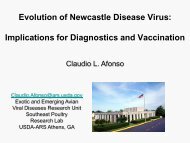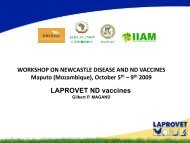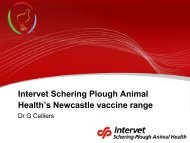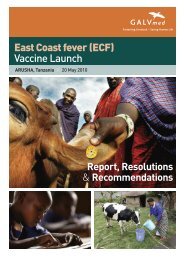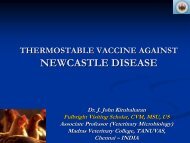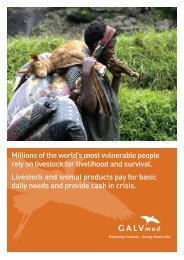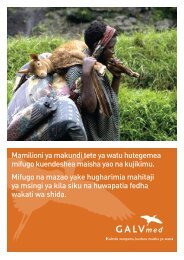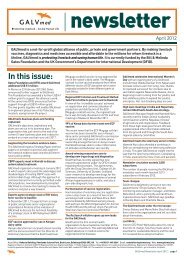A Path to Prosperity New Directions for African Livestock
GALVmed Impetus Strategy Paper
GALVmed Impetus Strategy Paper
- No tags were found...
Create successful ePaper yourself
Turn your PDF publications into a flip-book with our unique Google optimized e-Paper software.
4 Animal Health<br />
4.1 Animal Health in Africa<br />
Literature review and interviews carried out <strong>for</strong> the<br />
compilation of this paper reveal that improved animal<br />
health remains vital <strong>for</strong> Africa. It ensures lives<strong>to</strong>ck<br />
production is competitive and addresses the significant<br />
transboundary animal diseases and zoonotic disease<br />
challenges facing the Continent. <strong>African</strong> veterinary<br />
services are relatively poorly financed and equipped<br />
<strong>to</strong> deal with the challenges 39 . Some commenta<strong>to</strong>rs<br />
and organisations felt that animal health, particularly<br />
the control of trade-significant transboundary animal<br />
diseases, have been supported by policy makers and<br />
donors <strong>to</strong> the detriment of more mundane and<br />
arguably more challenging husbandry issues such<br />
as lives<strong>to</strong>ck nutrition, genetics and pasture<br />
management.<br />
In terms of poverty reduction, all agree that<br />
veterinary services in Africa are failing <strong>to</strong> adequately<br />
meet the needs of poor and small farmers,<br />
particularly those living in remote and marginalised<br />
areas. This section explores some of the reasons <strong>for</strong><br />
this situation and asks what can be done, where are<br />
the quick wins in terms of improving animal health in<br />
rural areas and who is addressing some of these<br />
issues.<br />
The scale of the disease problem certainly warrants<br />
concern. Africa hosts more serious diseases than<br />
any other continent. More than 90% of the diseases<br />
of lives<strong>to</strong>ck and poultry listed by the World<br />
Organisation <strong>for</strong> Animal Health (OIE) occur in Africa.<br />
Most serious and neglected zoonoses occur<br />
throughout SSA, eg. anthrax, rabies, brucellosis,<br />
bovine TB, zoonotic trypanosomosis, echinococcosis,<br />
cysticercosis and leishmaniasis. Sidibé estimated<br />
lives<strong>to</strong>ck mortality alone is costing an estimated<br />
US$2 billion per year in SSA 40 and others estimate<br />
losses due <strong>to</strong> preventable lives<strong>to</strong>ck diseases amount<br />
<strong>to</strong> US$4 billion per year – this is about a quarter<br />
of the <strong>to</strong>tal annual productive value of lives<strong>to</strong>ck in<br />
Africa 41 .<br />
In Oc<strong>to</strong>ber 2007, a conference co-organised by the<br />
World Bank and OIE in collaboration with FAO<br />
entitled “Global Animal health Initiative: the Way<br />
Forward,” concluded that the current state of<br />
veterinary services and preparedness levels in<br />
developing/transition countries continues <strong>to</strong> pose a<br />
real threat <strong>to</strong> the ability of preventing and controlling<br />
major disease 42 . Just how unprepared <strong>African</strong><br />
veterinary services are is not easy <strong>to</strong> determine.<br />
Even relatively simple numerical evidence, such as<br />
numbers of veterinary personnel per lives<strong>to</strong>ck unit,<br />
is not obtainable. The only significant systematic data<br />
available on personnel is reported <strong>to</strong> the OIE by<br />
member countries. However, review of this data 39<br />
showed that it is commonly inaccurate and, <strong>to</strong> date,<br />
the reporting <strong>for</strong>mat has not allowed differentiation<br />
between different categories of veterinary personnel,<br />
whether public, private or para-professionals. Recent<br />
per<strong>for</strong>mance of veterinary services (PVS) reviews<br />
carried out by OIE are now obtaining more accurate<br />
in<strong>for</strong>mation. PVS is a comprehensive, staged<br />
approach <strong>to</strong> providing targeted support <strong>for</strong> the<br />
systematic strengthening of veterinary services<br />
based on international standards and is described in<br />
more detail in Annex 1.<br />
The Impetus Strategy Paper I Page 23



